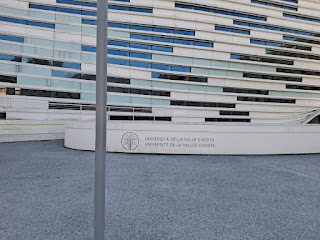This was a very important Conference regarding the hard times the world is living. We heard people that shared their experiences in many different war contexts (Jorge Burmeister-Petulá) and Palestine (Agnes Dudler); their projects of working "With families with traumatic experiences: evidence based trauma stabilisation programme (EBTS)" (Reijo Kaupillo); and the sharing of the Mona's Rakhawy "From sibling rivalry to wars: the role of group work and group psychotherapy". There were more than 120 participants. Thank you so much, Maurizio Gasseau and his team of the University of Aosta's Valey.
My own workshop was about: "Building Peace & conflict transformation: Galtung’s perspective".
Abstract:
Abstract:
Since 2008,
when the crises of the financial systems emerged, tensions, conflicts and wars started
to increase at all social levels until today. This situation is nurtured by
political polarisations based on fake-news and hate discourses propagated
through social media, promoting the increase of nationalisms and the extreme
right-wing populist parties, the threatening of immigrants and minorities, all
this associated with an unfair distribution of resources and in simultaneous
with the climate changes.
In this
workshop the proposal is to learn and to explore in a sociodramatic way, the
methodology developed by John Galtung (1930-2024), the founder of “Peace
Studies”. He developed a broaden social theory about violence and peace,
authoring concepts as direct violence, negative peace (absence of direct
violence), and positive peace, related with structural and cultural violence.
Promoting positive peace considers the future, and the values associated, is built
in the present, in the “here and now”, considering Human Rights, a better and
more equitable distribution of resources, regarding the survival, the
well-being, Freedom and a sustainable and promising relationship of each person
with their environment, in which everyone can develop their best potential in a
sustainable way for the common good of society. All these besides Social
Justice, participation and Democracy. This approach challenges us to
acknowledge conflicts, to transform them in a creative and non-violent way.
The
morenian Sociodrama approach, from our point of view, can give a great
contribution to conflict transformation through its technics like “future
projection”, “social atom”, “role-plays”, “role-reversal”, “time-lines” and
others, exploring the five phases proposed by Galtung (2008): (i) the
identification and analysis of conflicts; (ii) the common aims to be achieved
in the future; (iii) the critical reflection about both former phases; (iv) the
plan for action, with several steps; and (v) the implementation of the plan.
We need to
learn to live together by building common positive peaceful future scenarios.
We need to understand better each other, to dream and to dialogue, to express
ourselves, to act together and start by giving steps and more steps towards
Peace – it’s an everyday work and a goal. Let’s give some steps together on
this workshop towards Peace!
References:
Belchior,
M. (2013). Aprender na Sociedade da Informação e do Conhecimento - entre o
local e o global - contributos para a Educação para a Paz. Tese de
Doutoramento, Instituto de Educação - Universidade de Lisboa. http://hdl.handle.net/10451/8005
Ercoşkun, B. (2021). On Galtung’s Approach to Peace
Studies. Lectio Socialis,
5(I), 01–07. https://doi.org/10.47478/lectio.792847
Galtung, J. (2008). Form and Content of Peace
Education. In M. Bajaj (Ed.), Encyclopedia of Peace Education.
Information Age Publishing, pp. 49-58








.jpeg)



.jpeg)
.jpeg)
.jpeg)
.jpeg)
.jpeg)
.jpeg)
.jpeg)
.jpeg)










.jpeg)
.jpeg)
.jpeg)
.jpeg)
.jpeg)